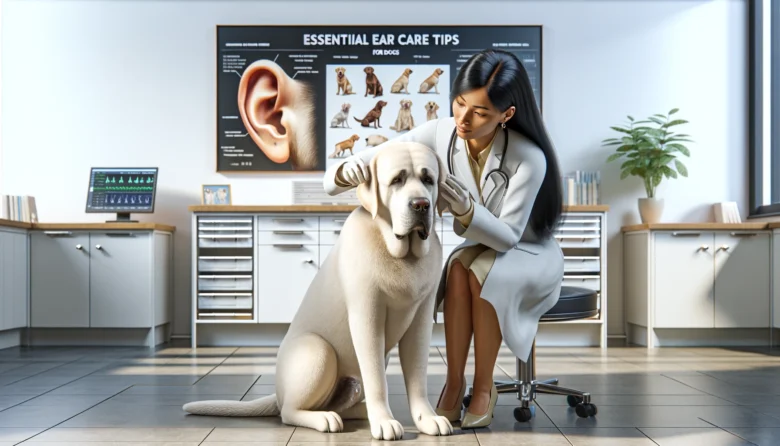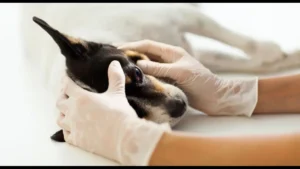Caring for your dog’s ears is an important part of keeping them healthy. By giving your pet’s ears the care they need, you can prevent infections, insects, and other problems that can make your pet uncomfortable or even sick. This article discusses important steps you can take to keep your dog’s ears healthy, such as regular checkups, proper cleaning, identifying problem areas, and seeking professional help.
1. Learn How Dog Ears Work:
Dogs’ ears are more complex than ours. Dogs’ ear canals are longer and more curved. This makes them more susceptible to ear problems, as dirt, water and insects can get inside. Understanding this structure is the first thing you need to do to properly care for your ears because it will change the way you look at and clean your ears.
2. Check Your Dog’s Ears Often:
Regular inspection of your dog’s ears is important to detect problems early. Healthy ears for dogs are clean, odorless and pale pink. Weekly checkups can help you notice any changes or warning signs, such as redness, swelling, discharge, or an odor that doesn’t seem right. These could be signs of an ear condition or other problems.
3. Clean Your Ears Well:
As part of your dog’s normal cleaning routine, you should clean his ears, but be careful not to hurt him. If your doctor tells you to use an ear cleaner, do the following:
- Slowly lift the ear flap to reach the ear canal.
- Do not put too much cleaning solution into the ear canal.
- Gently massage the base of your ears to help the cleanser remove dirt and smooth your skin.
- Have your dog shake his head to remove earwax and other objects stuck in the ear canal.
- Use a cotton ball or soft cloth to wipe away loose dirt and detergent. Do not insert cotton swabs into the ear canal, as they may damage the eardrum or push debris deeper into the ear canal.
4. Keep Moisture Under Control:
Dogs that swim or bathe frequently are more likely to develop ear infections due to moisture. Dry your dog’s ears thoroughly after swimming or bathing so that water doesn’t get trapped in the ear canal and cause illness.
5. Stop Parasites:
Ear mites are common insects that can live in a dog’s ears, causing them to itch, turn red and produce a black or brown discharge. If you follow your vet’s recommendations and use their recommended parasite treatments, the insects should stay away from you.
6. Food and Allergies:
What your dog eats can affect his or her overall health, including the health of his ears. Allergies to certain foods can cause ear infections and swelling. If your dog regularly has ear problems, contact your vet to see if changing your dog’s food or allergies can help.
7. How Do You Recognize an Ear Infection?
When a dog gets an ear infection, the following symptoms appear:
- Scratching or scratching the ears over and over again
- Shake his head many times
- Swelling, redness and warmth near the ears
- A bad smell comes from the ears
- Sound comes from the ears
If you notice any of these symptoms, take your hat to the vet immediately. If an ear infection is not treated, the condition can quickly worsen and lead to long-term problems or even hearing loss.
8. Professional Animal Care:
Wearing a hat at your vet’s for regular checkups can help prevent ear problems. A veterinarian can professionally clean your dog’s teeth, identify problems not visible to the naked eye, and recommend treatments or preventive measures that are best for your dog.
9. How to Avoid Common Mistakes:
Many dog owners mean well but make mistakes when cleaning their dog’s ears that can lead to problems. Do not place water or over-the-counter medications in your dog’s ears without first consulting your veterinarian. Don’t clean your ears too much either; this can damage the root canals and lead to diseases.
10. Training and Acclimatization:
Getting your dog used to having his ears touched can make cleaning them easier. Starting early and slowly getting them used to checking and cleaning their ears will help them get used to the process, making it easier for you and your dog during regular ear care.
Conclusion:
Caring for your dog’s ears is an important part of keeping your dog healthy. To take good care of your ears, you should have them checked regularly, cleaned well, kept dry, free of parasites, and treated by a veterinarian. If you follow these tips, you can help your dog keep his ears healthy and avoid pain and more serious health problems. For specific advice tailored specifically to your dog’s needs and health, please consult your veterinarian.
FAQs:
1. How often should I check my dog’s ears for problems?
To keep your dog healthy, check his ears weekly for redness, discharge, odor, or swelling. By conducting regular inspections, you can catch problems early before they get worse.
2. How often should I clean my dog’s ears, and what should I use?
Use an ear cleaner specifically designed for dogs that your vet recommends. Cleaning your dog’s ears depends on his breed, how active he is, and how healthy his ears are, but for most dogs, once a month is usually sufficient. But dogs who swim a lot or whose ears tend to get dirty may need more frequent cleanings.
3. Can I use cotton swabs to clean my dog’s ears?
Do not use cotton swabs or anything that can penetrate deep into the ear canal. They can damage the eardrum or push debris deep into the ear canal. Instead, after applying the cleaning solution, gently wipe the outside of the ear and accessible parts of the ear canal with a cotton ball or soft cloth.
4. What are the signs of ear infections in dogs?
If you have an ear infection, you may scratch or scratch your ears frequently, shake your head frequently, have red and swollen ears, and have a bad odor and discharge. If you notice any of these symptoms, contact your doctor immediately.
5. What can I do to prevent my dog from getting an ear infection?
Check and clean your dog’s ears regularly, make sure they stay dry, especially after swimming or bathing; and pay attention to any allergies to prevent ear infections. Additionally, visiting the vet for regular checkups can help identify and resolve problems before they turn into diseases.


